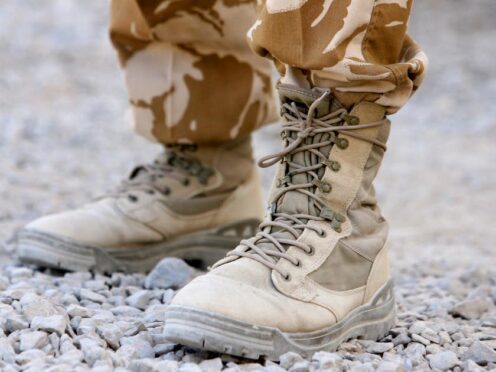
More than half of Army veterans in England have experienced mental or physical health issues since leaving the armed forces, a survey suggests.
The survey of 4,910 veterans, commissioned jointly by the Royal College of GPs (RCGP) and the Office for Veterans’ Affairs (OVA), found that 55% have experienced a mental or physical health issue potentially related to their service since returning to civilian life.
More than four in five of those stated that their condition had deteriorated during this time.

Despite this, one in seven said they had not sought help from a healthcare professional, with the most common reasons given they “prefer to manage their issues on their own” and believe a civilian health professional “won’t understand their experiences”.
Some 63% of veterans said they would be more likely to seek help if they knew their GP practice was signed up to the Veteran Friendly Accreditation scheme.
In light of the findings, a new initiative has been launched by the RCGP with NHS England and the OVA to encourage more GP practices to become “veteran friendly”.
Army veteran Jon Lynn, a patient at Orchard Surgery, Bromborough, said he had benefited from being able to access the right support with a veteran friendly accredited GP practice.
“After I left the military, I really struggled with both my mental and physical health and was at my lowest ebb when I eventually decided to seek help from my GP practice and share my service experiences,” he said.
“They immediately understood my needs and issues and were able to quickly refer me to the specialist health services that exist for veterans, where I was diagnosed with PTSD and given help and support to confront and manage both my mental and physical conditions.
“I firmly believe that having access to a veteran friendly accredited GP practice and sharing my status as a veteran saved my life as well as my marriage, enabling me to quickly and easily get the help and support I desperately needed.
“There are lots of veterans like me who are silently struggling with health issues, and I’d encourage all practices to sign up to the scheme, it could make a life-saving difference to your patients who have served in the armed forces.”
To date, more than 3,000 of England’s 6,313 GP practices are accredited.
Practices that sign up will be provided with a “simple process” for identifying, understanding and supporting veterans and, where appropriate, referring them to dedicated veterans physical and mental health and wellbeing services.
Minister for veterans’ affairs Johnny Mercer said that providing veterans with access to world class healthcare is “fundamental” to making the UK “the best country in the world to be a veteran”.
“As this new research shows, veterans are more likely to seek help if they know their practice is veteran friendly accredited,” he said.
“I’m therefore urging those practices that are yet to sign up to ensure our veterans access the support they need.
“This quick and simple step will help encourage more veterans to contact their GP and say they served.
“Doing so will help to ensure that they receive the care that’s right for them, which includes access to veteran-specific NHS health services, such as Op Courage.”

Enjoy the convenience of having The Sunday Post delivered as a digital ePaper straight to your smartphone, tablet or computer.
Subscribe for only £5.49 a month and enjoy all the benefits of the printed paper as a digital replica.
Subscribe